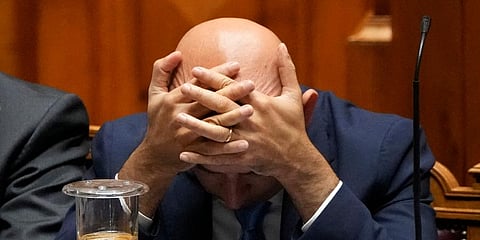

LISBON: Portugal’s president says the ballot box is the best way of breaking a political stalemate after the country's parliament threw out the minority Socialist government’s proposed state budget for next year.
The head of state's plan to hold a snap election could backfire, however, by producing an even more volatile political battleground, analysts say.
President Marcelo Rebelo de Sousa, who has no governing powers but seeks to ensure the smooth running of the country, said before the budget vote Wednesday that he would call an early poll if lawmakers rejected the government’s proposal.
When that happened, he set in motion the consultations he is required to make before dissolving parliament and setting an election date, swiftly meeting with the prime minister and parliament speaker over dinner.
He will also meet with political leaders, trade union confederations and business leaders before convening the Council of State, an advisory body, on Nov. 3. After that, he is widely expected to call an election, probably for January.
Against a backdrop of a fragmenting political scene, with the rise of smaller parties, and the likelihood that no single party will clinch a parliamentary majority, Portugal’s ambition of swiftly deploying tens of billions of euros (dollars) in post-pandemic recovery aid from the European Union is at stake.
“We’re heading into a phase of political turbulence in our country,” Francisco Pereira Coutinho, a politics professor at Lisbon’s Universidade Nova, said. “We’re going into uncharted territory.”
Recent opinion polls suggest the center-left Socialist Party will be returned to power with a comfortable win, capturing around 39% of the vote. That would leave the Socialists still shy of a parliamentary majority and Portugal back where it started.
The traditional center-right opposition parties, meanwhile, are in disarray. Both the main opposition Social Democratic Party and the smaller Popular Party are absorbed by leadership challenges.
The hard-left Communist Party and Left Bloc have seen their popularity dwindle to single figures in recent elections.
In the last election, in 2019, 10 parties won seats in the 230-seat parliament.
Most striking is the rise of Portugal’s first right-wing populist party, Chega! (Enough!. Founded just three years ago, it currently has one lawmaker, the party's leader, lawyer André Ventura. Chega! could collect as many as 20 seats at an election, potentially turning it into a kingmaker.
Commuters in Lisbon, Portugal's capital, expressed unease Thursday about what the immediate future holds for the country of around 10.3 million people.
Romi Silva, a lawyer, said Portugal needs to “overcome this situation very quickly so that we don’t waste the aid from the European Union.”
Rui Piedade, a teacher, said politicians “should have been worried about the crisis that we will now face.”